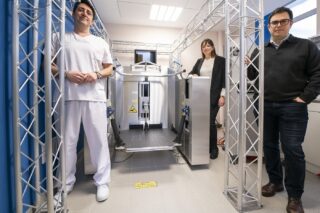Scientists in the UK have developed a breakthrough test that uses sweat from a woman’s fingertip to detect breast cancer. The pioneering fingerprint method offers a painless and non-invasive alternative to current breast cancer screenings and can be carried out from the comfort of a patient’s home.
A team of scientists at Sheffield Hallam University in the UK found that the simple test can detect cancer with 97.8% accuracy and it is being hailed as a game-changer for the early detection and treatment of cancer.
Professor Simona Francese, who led the research team, has been working in forensic science for the last 15 years, using fingerprints to extract information about a person to aid in criminal investigations.
She said the discovery that the same method could be used to pick up cancer was “quite serendipitous.” Prof Francese was researching the difference between male and female fingerprints when she discovered that the proteins and peptides released by sweat on the fingerprint also contain biomarkers of cancers. She explained:
“It was a complete stroke of luck really to stumble across this information.
Most biomarkers of cancer are present in the bloodstream and the ones we found are only present in sweat. So it was a massive discovery to see that those biomarkers can diffuse from the bloodstream to the sweat glands and then be picked up from a fingerprint.”

Having made this discovery, Prof. Francese and her team then fought tirelessly to get funding to explore it further. She said:
“I am not a cancer expert, so I was turned down quite a lot. People didn’t trust me.”
Then in 2018, the team received a grant from the Medical Research Council that enabled them to carry out their breakthrough trial involving 135 samples from 15 women with benign, early or metastatic breast cancer.
Prof. Francese worked with oncologists and a computer scientist who developed the machine learning algorithm used to predict the correct category of cancer. In 2023, they published the results of the small trial, which found that fingerprint and AI technology could predict cancer with 97.8% accuracy.
Prof Francese added:
“Somebody has to just swipe a finger tip on a surface a couple of times and that would give us enough material to detect the cancer biomarkers. Then the AI was able to use the pattern in which they were showing up to determine whether a patient was benign, or metastatic, etc.”
The team are now seeking funding to carry out a full-scale clinical trial with the aim of applying the method to detect all types of cancer.
Scope of the Problem
According to the World Health Organization, there were 2.3 million women diagnosed with breast cancer and 685,000 deaths globally in 2020. As of the end of 2020, there were 7.8 million women alive who were diagnosed with breast cancer in the past 5 years, making it the world’s most prevalent cancer.
Breast cancer occurs in every country of the world in women at any age after puberty but with increasing rates in later life. Traditional methods of screening and detection, such as mammograms and biopsy, are effective but can be awkward and painful and expose the patient to radiation.

This new fingerprint test could encourage more women to have regular screenings, which would help to reduce healthcare backlogs. According to the scientists, a sample collection plate could be sent to patients at risk of cancer every few years, to be done in the comfort of home.
Lynda Wyld, a professor of surgical oncology at the University of Sheffield, explained:
“This novel technique is still at an early stage in its development but the results are very promising.
The technique holds great potential both for the screening and diagnosis of breast cancer but also for monitoring how well treatments such as chemotherapy are working. This would potentially save women having regular CT body scans every few months.”










